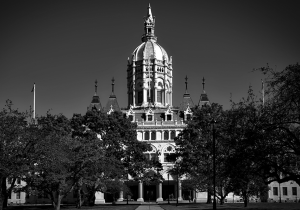From Gaffney, Bennett & Associates
March 3, 2014 – March 7, 2014
Off campus and on campus (yes, it does feel like high school at times at the Capitol) there was a flurry of activity this week as we move toward the halfway point in the session and committee deadlines. The session adjourns May 7. The Labor Committee on Tuesday voted the minimum wage hike proposal out of committee, with a degree of certitude and symbolism, on the eve of a visit by President Obama to stump for the proposal, which mirrors his call for a $10.10 minimum wage at the federal level. His visit to Central Connecticut State University Wednesday made for a relatively quiet day at the Capitol. Everything was back to business on Thursday and Friday, however. Following are some highlights of committee action.
- Connecticut Businesses Ask: “Where is Connecticut Headed?”
The questions on the minds of business leaders at this year’s Business Day at the Capitol, sponsored by the Connecticut Business and Industry Association, tended to focus on state investment and sustainable growth. Business leaders were looking for policymakers to shed some light on where the state is headed when it comes to investing in transportation, education, job training and energy.
How about tax and budget talk instead? Governor Malloy tried to reassure the audience that he would not raise taxes if he runs and is re-elected in November, but rather would seek to provide additional tax relief—he has proposed using $200 million of the current year surplus to provide middle income earners a $55 rebate. And despite fiscal projections of a looming $1 billion deficit in 2016, Malloy said he is confident that the economy will accelerate enough that, when combined with spending restraint in the 2% + range, the gap can be covered.
“There needs to be a real conversation in Connecticut about an investment strategy for the future,” said Joe McGee, v.p. of public policy for the Business Council of Fairfield. Sound familiar?
- Public Health Committee Hearing on Staffing Levels
Proposals to increase nursing staff levels – HB 5384 – always spark passionate debate between nurses and hospitals, and this year is no exception. The Public Health Committee heard reams of testimony from overworked nurses on Wednesday as well as from the strapped hospital community. HB 5384 would require hospitals to file annual reports with the Department of Public Health on prospective nurse staffing plans and quarterly reports on actual daily nursing staff-to-patient ratios.
The Connecticut Hospital Association opposed the bill, arguing that “it would create an unnecessary administrative burden and have not meaningful effect on the provision of safe, quality patient care.”
- BPA Labeling Bill Heard in Environment Committee;
“The weight of scientific evidence does not support SB 316,” proclaimed toxicologist Dr. Lorenz Rhomberg testifying on behalf of the Can Manufacturers Institute. SB 316, which was heard in the Environment Committee Friday evening, would require labeling of products containing BPA. Citing a recently released FDA study, Rhomberg said the agency responded to the question “Is BPA Safe” with one word: “Yes.” In conclusion, Rhomberg, said, “Labeling food packaging will not give consumers any information regarding harmful toxicants, and may have the unintended consequences of leading them to make unhealthy food choices.”
A bill to ban fracking waste in Connecticut was also approved by the Environment Committee Friday. It will likely have to take a journey, however.
- AG, CHA Support Measure to Provide More Pricing Transparency
While their may be some more refinements needed, the Connecticut Hospital Association and the Attorney General’s Office appear to have come to consensus on a proposal that would require hospitals, health systems, and physician-owned practices with which they are affiliated, to provide consumers with notification of the separate fees (e.g. facility fees and providers fees) they may be charged prior to receiving the service. The fee bill, HB 5337, was heard in the General Law Committee Friday.
- Wesleyan Achieves a First…
With onlookers aplenty, Wesleyan University in Middletown Thursday became the first to fire up a microgrid in the state under a pilot program. Round 2 applications now being accepted.


